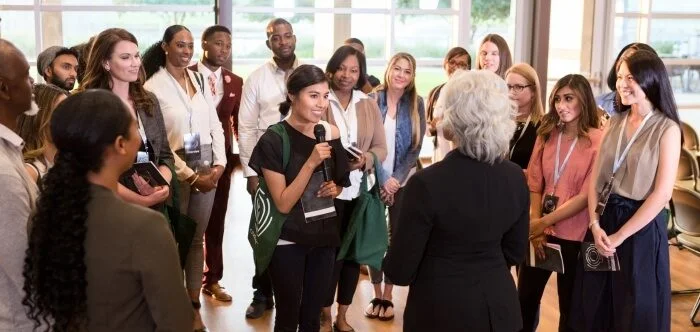The preparation and coordination for a conference are crucial to ensure its success. It requires balancing various elements to create an engaging and smooth experience for attendees. So, what do you need to host a conference?
You’ll need a suitable venue equipped with reliable audio-visual technology and a strong internet connection. For delivering valuable content, highly qualified speakers are essential, while effective promotion and registration systems help reach and manage attendees.
Additionally, catering and accommodations may be necessary to maximize attendee comfort. Dive into the rest of our article to explore each requirement in detail and discover how to set up a successful conference.
Conference Hosting – What is It About?
Conference hosting is about organizing and managing an event where people gather to share knowledge and ideas. The process involves coordinating various aspects to ensure the event runs smoothly. It requires careful planning, attention to detail, and the ability to handle unexpected situations.

A successful conference host focuses on creating an engaging and productive environment for all participants. They ensure that sessions start on time and speakers are well-prepared. So knowing about the host responsibilities in a conference is crucial for achieving desired outcomes.
An effective conference management strategy relies on effective communication and organization. The host’s role includes leading discussions, managing schedules, and addressing attendees’ needs. Ultimately, the host’s dedication can greatly influence the conference’s success.
Popular Types of Conferences You Can Host
Conferences are dynamic events that cater to various interests and industries, each with its unique format and focus. They provide platforms for networking, learning, and sharing insights. Here are some popular types of conferences you can host.
Academic Conferences
These gatherings are ideal for educators, researchers, and students. They focus on sharing scholarly research and academic developments. The purpose of joining academic conferences is to present papers, engage in discussions, and network with peers. Such conferences often lead to collaborations and academic advancements.
Business Conferences
Aimed at professionals, these events discuss market trends, strategies, and innovations. They’re opportunities for networking, skill development, and learning from industry leaders. Business conferences often include workshops, keynote speeches, and panel discussions. They’re pivotal for professional growth and industry insights.
Tech Conferences
These are platforms for showcasing technological advancements and innovations. Tech enthusiasts, developers, and entrepreneurs gather to exchange ideas. These events often feature product launches, tech demos, and expert talks. They’re crucial for staying updated in the fast-evolving tech world.
Medical Conferences
These conferences are essential for healthcare professionals. They focus on medical research, case studies, and new treatment methods. Such gatherings are key for continuing education and discussing healthcare advancements. Medical conferences significantly contribute to improving patient care.
Industry-specific Conferences
These are tailored to specific sectors like finance, law, or education. They provide a focused environment for discussing industry-specific challenges and solutions. Such conferences are great for specialized networking and learning. They help professionals stay ahead in their specific fields.
Digital Marketing Conferences
Nowadays, digital marketing conferences are becoming more popular, attracting professionals, entrepreneurs, and marketers interested in keeping up with digital marketing trends, strategies, and technology.
Workshops and Seminars
While smaller in scale, these are impactful for targeted learning. They focus on specific skills or topics, providing hands-on experiences. These are ideal for in-depth learning and personal interaction with experts. Workshops and seminars are effective for skill enhancement and focused discussions.
Hosting a conference, regardless of its type, is a meaningful endeavor. It brings together like-minded individuals to share, learn, and grow. Each type offers unique opportunities and experiences, contributing significantly to personal and professional development.
What Do You Need to Host a Conference?
Organizing a conference is a complex task that combines several key elements to ensure a successful and enriching experience. It involves creating an environment where professionals can connect, learn, and share insights. Here’s a breakdown of what do you need to host a conference:
Suitable Venue
Choosing the right venue is one of the key elements to host a conference. It should not only fit your audience size but also resonate with the conference’s theme. Consider factors like location, accessibility, and amenities. An ideal venue contributes significantly to the event’s atmosphere and attendee comfort.
Reliable Audio-Visual Equipment
Quality audio-visual equipment is essential for clear communication. This includes microphones, speakers, projectors, and screens. It’s important to have technical support on hand to address any issues. Good AV equipment ensures that presentations are delivered effectively, enhancing the overall experience.
Strong Internet Connection
In today’s digital age, a stable internet connection is a necessity. It supports various aspects like live streaming, social media engagement, and attendee interaction. Make sure the Wi-Fi is reliable in all areas of the venue. This connectivity is key for a seamless and modern conference experience.
Clear Agenda
A well-planned agenda guides the conference’s flow. Include session timings, speaker information, and networking breaks. This helps attendees plan their day and ensures that the conference runs smoothly. A clear agenda is vital for maintaining order and timeliness.
Skilled Speakers
The caliber of speakers can make or break a conference. Select individuals who are not only experts in their field but also engaging presenters. Diverse speakers from various industries can add richness to the discussion. Their expertise and delivery style contribute greatly to the event’s success.
Effective Promotion
Successful promotion is essential to attract attendees. Use a mix of digital marketing, traditional advertising, and community outreach. Highlight key speakers, topics, and unique opportunities for networking and learning. Effective promotion increases visibility and attendance.
Efficient Registration System
A streamlined registration process is critical. It should be user-friendly and capable of handling a large volume of attendees. Consider online registration to simplify the process. An organized registration system reflects the conference’s overall professionalism.
Catering and Accommodation
If your conference spans several days or is out of town, consider providing food and lodging options. Quality catering services that accommodate various dietary needs are appreciated. Partner with nearby hotels for accommodation deals. These aspects ensure attendee comfort, contributing to a positive conference experience.
Each element plays a vital role in the success of a conference. From the physical setup to the content and attendee management, every detail contributes to creating a memorable and impactful event.
How to Successfully Host a Conference?
Bringing people together for a conference requires careful planning and attention to detail. A well-organized event keeps attendees engaged and ensures a smooth experience for both speakers and participants. From venue selection to seamless execution, every aspect matters. Let’s explore the key steps to make it a success.
Plan with Clear Goals
A successful conference starts with a clear purpose. Before diving into logistics, define what you want attendees to gain from the event. Whether it’s industry discussions, knowledge sharing, or networking, aligning the agenda with the main objective ensures an impactful experience. Setting realistic goals helps in making better decisions throughout the planning process.
Choose the Right Venue
Selecting the perfect location is crucial for creating a comfortable and professional environment. Factors like accessibility, seating capacity, and technical support should be considered when finalizing the venue. A well-equipped space allows speakers and attendees to focus on the event without disruptions. The venue also plays a role in the overall impression, so choosing wisely can enhance engagement.
Promote for Maximum Attendance
A well-planned event needs effective promotion to attract the right audience. Leveraging social media, email campaigns, and industry networks can help spread the word. Engaging content, speaker highlights, and event updates keep potential attendees interested. Many well-known events, such as conference in Canada, effectively use promotional strategies to gather a diverse group of participants. A strong marketing approach ensures higher turnout and active participation.
Organize a Structured Agenda
A well-structured schedule keeps the event organized and engaging. Avoid overloading attendees with back-to-back sessions, and include breaks for networking and relaxation. Balancing keynote speeches, panel discussions, and interactive workshops creates a dynamic experience. Providing a clear agenda in advance allows attendees to plan their time efficiently.
Ensure Smooth Execution
On the event day, everything should run as planned. A dedicated team should handle registration, technical support, and attendee assistance. Having backup plans for potential issues, such as equipment failures or last-minute schedule changes, can prevent disruptions. Regular communication with staff ensures a seamless flow throughout the conference.
Gather Feedback for Future Events
Post-event feedback helps in improving future conferences. Sending out surveys or having a feedback session allows attendees to share their thoughts. Understanding what worked well and what could be improved makes it easier to plan better events in the future. A well-received conference sets a strong foundation for future gatherings.
Hosting a conference successfully is all about planning, execution, and engagement. With the right strategies, you can create an event that leaves a lasting impression on attendees. Paying attention to every detail ensures a rewarding experience for everyone involved.
Why Should You Host a Conference?
Hosting a conference can be a powerful tool for any organization, offering numerous benefits. It’s an opportunity to bring people together, share knowledge, and create lasting impacts. Here’s why you should consider hosting a conference.
Networking Opportunities
Conferences provide a unique platform for networking. Attendees meet peers, industry leaders, and potential collaborators. These interactions often lead to meaningful professional relationships and opportunities. Networking at conferences can open doors to new partnerships and business ventures.
Knowledge Sharing and Learning
Conferences are hubs of knowledge exchange. They feature experts discussing the latest trends, research, and innovations. Attendees gain insights and learn new skills relevant to their fields. This shared knowledge can spark new ideas and inspire change.
Showcasing Leadership and Expertise
Hosting a conference positions your organization as a thought leader. It demonstrates expertise and commitment to your industry. This enhances your organization’s reputation and credibility. It’s an effective way to establish authority in your field.
Marketing and Visibility
Conferences offer significant marketing benefits. They increase the visibility of your brand among a targeted audience. Hosting a conference showcases your organization’s strengths and values. It’s a powerful tool for brand promotion and awareness.
Generating Revenue
Conferences can be a source of revenue. This comes from registration fees, sponsorships, and exhibitions. Well-organized conferences attract more attendees and sponsors. This financial aspect can support your organization’s growth and future projects.
Feedback and Community Building
Hosting a conference provides direct feedback from your target audience. You learn about their needs, challenges, and interests. It’s an opportunity to build a community around your brand or field. This community engagement is invaluable for long-term success.
Hosting a conference offers multifaceted benefits. From networking and learning opportunities to marketing and financial gains, the advantages are substantial. A well-executed conference can elevate your organization’s status, creates a sense of community, and contribute significantly to your industry.
Key Tips to Find the Right Conference to Host
Finding the right conference to host is crucial for its success and relevance to your audience. It involves understanding your goals, audience interests, and the industry landscape. Here are some key tips to guide you in selecting the perfect conference.
- Identify Your Goals: Understand what you aim to achieve with the conference. Clear objectives guide your theme, content, and target audience selection.
- Know Your Audience: Research your potential attendees’ interests and needs. Tailoring the conference to their preferences ensures higher engagement and satisfaction.
- Assess Industry Trends: Stay updated on current trends in your field. Choosing a relevant and timely topic will attract more attendees.
- Budget Considerations: Determine your budget early in the planning process. This will influence the scale, location, and resources you can allocate to the conference, all of which are important parts of the conference coordinator’s tasks.
- Location Matters: Choose a venue that’s accessible and appealing to your audience. The right location can significantly enhance the attendee experience.
- Check Competitor Events: Analyze similar events in your industry. This helps in differentiating your conference and avoiding scheduling conflicts.
- Collaborate with Experts: Partner with industry leaders and experts for content creation. Their insights add value and credibility to your conference.
Selecting the right conference to host is a strategic process that requires careful consideration of several factors. By focusing on your goals, audience, and industry dynamics, you can create an event that resonates with attendees and achieves your objectives.
Conclusion
Organizing a successful conference begins with understanding “What do you need to host a conference?”. It goes beyond securing a venue and involves crafting an experience that makes an impact with attendees.
A combination of engaging content, expert speakers, and effective marketing strategies plays a key role in conference popularity. Additionally, a quality catering service and efficient registration processes contribute to the event’s success.
In essence, hosting a conference is an art that combines detailed planning with a deep knowledge of audience needs. This process not only contributes to knowledge sharing but also strengthens your organization’s standing in the industry.







